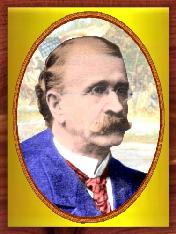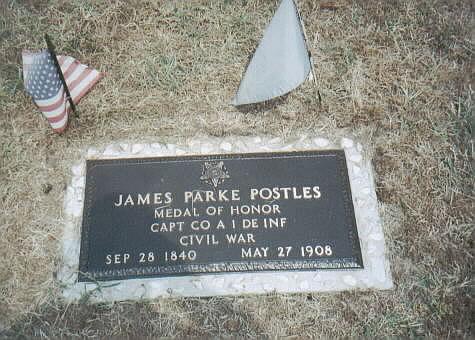




(September 28, 1840 - May 27, 1908) Captain, Co. A, 1st Delaware Infantry Citation: Voluntarily delivered an order in the face of heavy fire of the enemy.
 "James Parke Postles" was born September 28, 1840, in Camden, Delaware the son of Stephen and Elizabeth Roe Postles. When the Civil War broke out, he enlisted in Co. C, 1st Delaware Regiment under Col. Henry Lockwood in Wilmington, Delaware. The enlistment was for only three months and Postles was mustered out as a 1st Sergeant. Upon reorganization of the regiment, Postles was commissioned 1st Lieutenant of Company A on October 1, 1861. The unit was transferred to Fortress Monroe, Virginia where they fought in the Battle of Chantilly on September 1, 1862. The 1st Delaware Regiment then found itself assigned with General George B. McClellan, who was moving to intercept Rebel Robert E. Lee as he advanced into Maryland. They met at a place by the Antietam creek called Sharpsburg, Maryland. Postles' Company, Company A, lost 44 of its 85 men, including Captain Evan S. Watson. Postles was cited by his commanding officer who wrote of Acting Adjutant Postles as having "behaved with exemplary coolness and bravery". Postles was then named the new Captain of Company A. After Antietam, the regiment marched via Harper's Ferry to Fredericksburg where it went into battle in December. Postles was thereafter named "Inspector General of the 2nd Brigade, 3rd Division of General Winfield Hancock's 2nd Corps". Postles deed of valor came on the second day of the Battle of Gettysburg. There, the 1st Delaware Regiment was a part of Lieutenant Colonel Thomas Smyth's 2nd Brigade, Brig. General Hays's 3rd Division of Major General Hancock's II Corps. This day, July 2, 1863, the above soldiers were placed between the Taneytown and Emmitsburg roads just west of Cemetery Ridge. Located about one half a mile in front of the Union lines was the Bliss Farm consisting of a house and barn. All day both sides fought over possession of this farm. Around 6 o'clock in the evening Rebel sharpshooters gained the Bliss house and were causing a great deal of problems for the Union soldiers. To help put a stop to this four companies of the 12th New Jersey Regiment aided the 1st Delaware Regiment in gaining possession of the barn some 60 yards from the house. The Rebel's however wouldn't leave the house and continued to wreck havoc on the Union soldiers. General Alexander Hays, division commander, sent word to Col. Smyth who was approximately 1/2 mile away to have his men in the barn "take that damned white house and hold it at all hazards!" Col. Smyth turned to his men that were with him and said "Gentlemen, you hear, who will take the order?" At that moment Postles was sitting on a rock a few feet away with his head in his hands having been sick for several days. Not hearing any response to Smyth's request, Postles raised his head and answered: "I will take it, sir." Postles mounted his horse, crossed the Emmitsburg Road, and headed at a gallop in the direction of the barn half a mile distant. The moment he crossed the Emmitsburg Road, Postles began to draw fire from the Rebel sharpshooters in the house which became so hot that he wondered why none of the bullets hit him or his horse. The closer he got, the thicker the bullets, but he reasoned he was safe as long as he was in motion and wondered what he was going to do when he stopped to deliver the message at the barn? Surely the bullets would then find their marks because they were firing at him from every window and door of the house just 60 yards away. As he got closer to the barn, he dug his spurs violently into his horse's sides. He later wrote: "The poor brute, his sides torn up by my spurs and his mouth lacerated and bleeding from the cruel curb-bit, reared, and kicked and plunged, so that I was as bad a mark as though in full gallop." He stopped and shouted out his message to the barn and as soon as they acknowledge it he raced safely back to his lines. When he got about 300 yards from the Rebel sharpshooters and felt safe, he reined in his horse and turned in his saddle. Taking off his cap, he waved in at the Rebels in defiance. That brought on the Rebel yell as they stopped firing at him. He rode back to the Union lines amidst three cheers and the congratulation of the corps commander himself, General Winfield Hancock. Out on the farm the Union soldiers attacked and took possession of the house, taking 40 prisioners and burning both the house and barn to the ground. As the prisoners were brought in, they recognized Postles as the daring rider and one of them said "Well sir, I guess your time hain't come yet." Postles asked the man what he meant and he related to him that he himself had three clean shots at him and so had others and neither the horse nor rider had been hit once. After the war, Postles returned to Delaware and went into his father's leather business with his brother. In 1878, he was named "Adjutant General of Delaware" by Gov. John Cochran. Finally, on July 22, 1892, he was awarded the Medal of Honor 29 years and 20 days after the deed. Postles died on May 27, 1908, of a brain concussion after falling down the stairs of the Wilmington Masonic Temple (now the Grand Opera House). He was interred in the Wilmington-Brandywine Cemetery. 
"Click Here" for James Parke Postles' Find A Grave record.
  
Email any questions or comments to: Russ Pickett by "Clicking Here" Last update: 7/15/2007 |